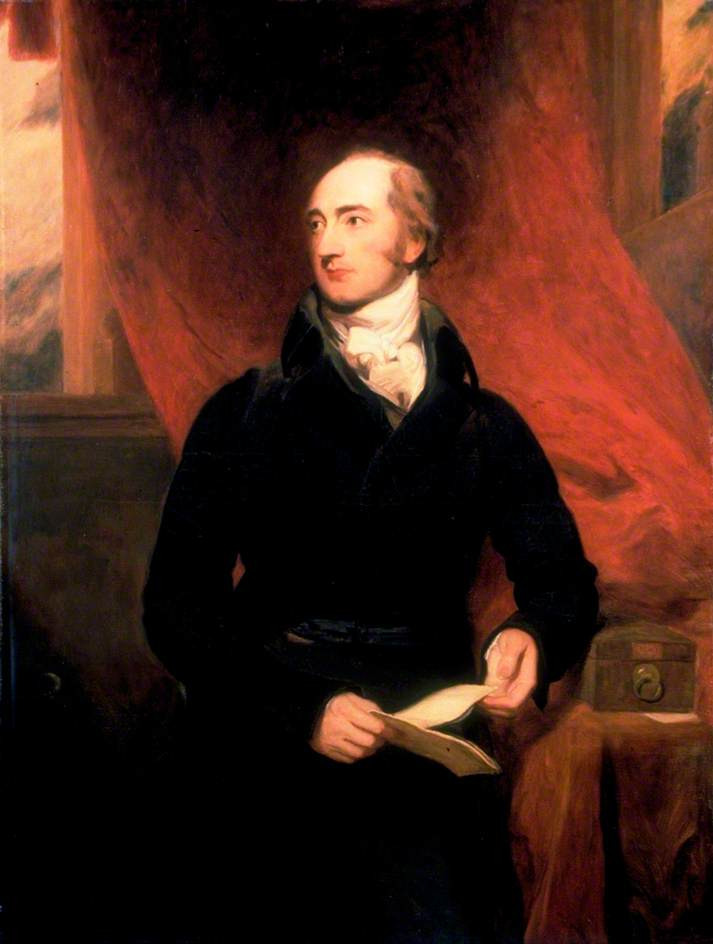Get Today in Masonic History into your Inbox. Sign up today for one of our email lists!
Need an article for your Trestleboard/Newsletter see our Use Policy
George Canning Passes Away

Today in Masonic History George Canning passes away in 1827.
George Canning was an British politician.
Canning was born on April 11th, 1770 in London, England. He described himself as "an Irishman born in London" because of his heritage on his father's side. His father left the family on Canning's 1st birthday. It was most likely due to the massive debt his father was in. At one point his father gave up his claim to his inheritance in exchange for the clearing of his debt. Due to his father's departure, Canning's mother became a stage actress which was an unfavorable position socially at the time. From an early age Canning showed himself to be highly intelligent. Family friends asked Canning's uncle, who was a man of some means, to take in Canning so allowing him a proper eduction. Canning attended Hyde Abbey School, Eton College and Christ Church, Oxford. He graduated Eton at the top of the school.
Canning's uncle was a Whig and introduced Canning to other prominent members of the Whig party. Canning was planning on entering politics as a Whig. After seeing the radicalism of the French Revolution, Canning changed became a Tory. This created an expression among the Whigs "that men had often turned their coats, but this was the first time a boy had turned his jacket." At the time Canning was in his early twenties.
In 1793, Canning became associated with William Pitt the Younger. Their association lasted their entire lives. Canning saw Pitt as something of a father figure and despite some differences over the years, Canning often remained loyal to Pitt even at the expense of his own career. Pitt was the one who helped Canning win his first two seats in the House of Commons. Pitt named him the Under Secretary of State of Foreign Affairs. Canning often supported Pitt in disputes between Pitt and the Foreign Secretary.
In 1797, Canning was involved in the creation of a newspaper called the Anti-Jacobin. In it Canning used his piercing wit to satirize Jacobin policies and ideas. Canning's satire, not just in the Anti-Jacobin caused him problems. Although he was seen as a charismatic man, he was also seen as divisive and risked losing an ally for personal reasons. He once reduced Lord Liverpool to tears when he created a satirical poem mocking Liverpool's attachment to his time in the militia. He then forced Liverpool to apologize for getting upset.
In 1799, Canning became a Commissioner of the Board of Control for India, which put him in charge of the East India Company. He held the position a second time in 1816.
In 1801, Pitt resigned as Prime Minister in protest of the King's opposition to Catholic Emancipation. Canning who was very loyal to Pitt resigned from the Government as well. Still in Parliament became somewhat bitter with Pitt who he felt had not treated him well despite his loyalty.
In 1804, Pitt returned as Prime Minister and Canning was made the Treasurer of the Navy. He offered his resignation the following year when Pitt placed Henry Addington, a political rival, in the cabinet. Once again Canning felt slighted by Pitt. After some back and forth, Canning withdrew his resignation. Canning left his position the following year in 1806 when Pitt passed away and he was not offered a position in the new government.
In 1807, a new government was formed and this time Canning was made Foreign Secretary. This was a critical time during the Napoleonic Wars. Canning became concerned after Prussia fell to the French, Denmark wasn't going to maintain it's neutrality. He sent a British fleet to Copenhagen requesting they turn over their fleet in support of the British during the war with France. When negotiations broke down, Canning planned an assault on Copenhagen which caused the Danes to surrender their fleet.
In 1809, Canning fought a duel with the Secretary of State for War and the Colonies, Lord Castlereagh. The two men were constantly at each other and when it was discovered Canning made a deal to have Castlereagh removed, Castlereagh insisted on a duel with Canning. Canning had never fired a pistol and missed badly, his opponent was considered the best shot in London and hit Canning in the thigh. After the duel both men were criticized for not solving their problems in a better manner.
In 1822, Castlereagh committed suicide while he was the Foreign Secretary. Canning who was at the time the Leader of the House of Commons assumed the role under Lord Liverpool's Government. In 1827, Liverpool suffered a stroke and was forced to resign. King George IV, despite there having previously been tension between the two men regarding Queen Caroline's treatment and a possible affair between Canning and the Queen, appointed Canning as Prime Minister. By the time Canning was appointed he was already in poor health and his tenure as Prime Minister was the shortest in the history of the United Kingdom at 119 days.
Canning passed away on August 8th, 1827.
Canning was a member of Prince of Wales Lodge, now Prince of Wales Lodge No. 259.
This article provided by Brother Eric C. Steele.

